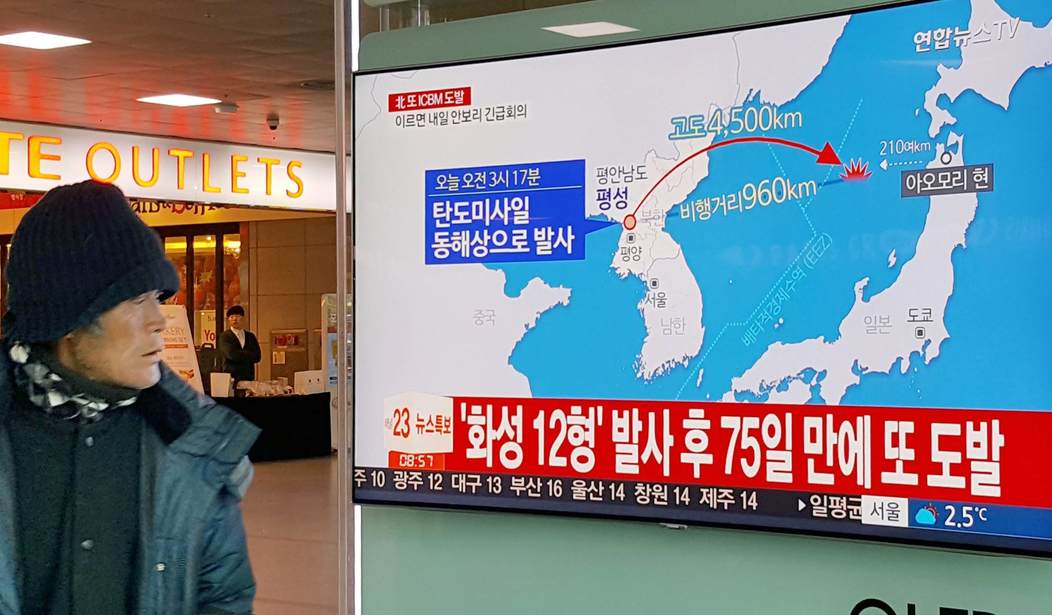WASHINGTON — President Trump said nothing has changed in his administration’s approach to the North Korea nuclear crisis as Pyongyang launched an intercontinental ballistic missile today that reached a height of nearly 2,800 miles — a new record for the North’s tests.
South Korea’s Yonhap news agency said the projectile flew about 600 miles. It flew for about 50 minutes. “North Korea launched an unidentified ballistic missile eastward from the vicinity of Pyongsong, South Pyongan Province, at dawn today,” South Korea’s Joint Chiefs of Staff said.
The Defense Department said the ICBM splashed into the Sea of Japan, within Japan’s Exclusive Economic Zone; Japanese officials said the missile broke into pieces before hitting the water. Pentagon Spokesman Col. Robert Manning said NORAD determined the launch “did not pose a threat to North America, our territories or our allies.”
“Our commitment to the defense of our allies, including the Republic of Korea and Japan, in the face of these threats, remains ironclad,” Manning said. “We remain prepared to defend ourselves and our allies from any attack or provocation.”
At the White House, Defense Secretary James Mattis noted that the ICBM “went higher, frankly, than any previous shot they’ve taken.”
“It’s a research and development effort on their part to continue building ballistic missiles that could threaten everywhere in the world, basically,” Mattis said. “And in response, the South Koreans have fired some pinpoint missiles out into the water to make certain North Korea understands that they could be taken under fire by our ally.”
“But the bottom line is, it’s a continued effort to build a threat — a ballistic missile threat that endangers world peace, regional peace, and certainly, the United States,” he added.
Trump declared that “we will take care of that situation.”
“We have a very serious approach, but nothing changed,” he said. “We take it very seriously.”
The White House said Trump and Japanese Prime Minister Shinzo Abe spoke by phone after the launch and “agreed that the North Korean regime’s provocative actions are undermining its security and further isolating it from the international community.”
A spokesman for South Korean President Moon Jae-in said Trump and Moon “agreed to continue their efforts to bring North Korea to the dialogue table by continuing to put sanctions and pressure on North Korea in close cooperation with the international community, while firmly and strongly dealing with North Korean provocations based on the strong joint defense posture of South Korea and the United States.”
Secretary of State Rex Tillerson said that the United States, in conjunction with Canada, “will convene a meeting of the United Nations Command Sending States to include the Republic of Korea and Japan and other key affected countries to discuss how the global community can counter North Korea’s threat to international peace.”
“Diplomatic options remain viable and open, for now,” Tillerson added. “The United States remains committed to finding a peaceful path to denuclearization and to ending belligerent actions by North Korea.”
Senate Foreign Relations Committee Ranking Member Ben Cardin (D-Md.) said the nuclear threat underscores that it’s the wrong time for Trump and Tillerson “to starve the State Department of resources, senior leadership and its important role in America’s national security apparatus.”
“If left unchecked, North Korea will soon have an effective, if small, nuclear arsenal and the means to deliver it,” Cardin said. “What is therefore required is an all-out diplomatic surge, led by the Trump administration in collaboration with China and our Japanese and South Korean allies, where Pyongyang verifiably halts its nuclear and ballistic missile testing and we initiate negotiations toward denuclearization.”
Sen. Lindsey Graham (R-S.C.), a member of the Armed Services Committee, told CNN that North Korea thinks “if they get an ICBM to hit America with a nuclear weapon on top, they’re home free.”
“I believe that, whether they use it or not, they’re liable to sell any technology. It’s not in the world’s interest for Kim Jong-un to have a hydrogen bomb and a bunch of missiles,” Graham said. “So I think they believe the best way for the regime to survive is to be able to attack America. They’re making the biggest miscalculation in modern history to — if North Korea watches CNN, I hope you understand that President Trump is not going to allow the United States to live under the threat of a nuclear missile, a nuclear weapon coming to America from North Korea.”
“And if you want that capability, you’re going to get in a fight with the United States and you’re going to lose that fight and that’ll be the end of the regime,” he added.









Join the conversation as a VIP Member